'Law And Order' And Other Cop Network TV Shows Have Run Their Course
- Oops!Something went wrong.Please try again later.
- Oops!Something went wrong.Please try again later.
- Oops!Something went wrong.Please try again later.
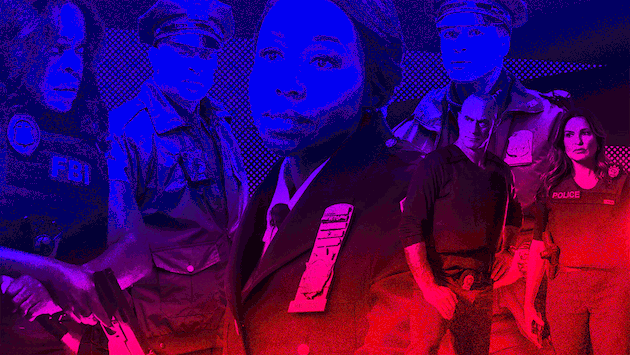
(Photo: Illustration: Damon Dahlen/HuffPost; Photos: NBC/CBS/ABC/Getty)
In a bit at the Emmy Awards earlier this month, Mariska Hargitay and Christopher Meloni, aka Olivia Benson and Elliot Stabler, reprised their signature will-they-won’t-they sexual tension. Introduced by announcer Sam Jay as “two cops no one wants to see defunded,” the beloved “Law and Order: SVU” duo leaped onstage to apprehend a masked thief stealing an Emmy statuette, before presenting the award for Outstanding Lead Actor in a Comedy Series to “Ted Lasso” star Jason Sudeikis.
It was admittedly fun: Benson and Stabler together again! But it was also “copaganda,” which is par for the course for the “Law and Order” franchise.
Historically, most police procedurals and other crime-related shows have lionized cops and presented a one-sided view of policing. After the murder of George Floyd went viral in 2020, increased public scrutiny of what has become known as “copaganda” forced TV creators and executives to reexamine how they depict police and other law enforcement stories on-screen. That June, in a poll conducted by Morning Consult and The Hollywood Reporter, 56% of all respondents and 59% of Black respondents said shows about police “should change to better represent the criminal justice system.” In a long overdue moment of assessment, some shows were axed completely, like the reality shows “Cops” and “Live PD,” which followed police officers in real time and often sensationalized violence. Some creators and writers of scripted police series, from the “Law and Order” franchise to “Brooklyn Nine-Nine,” promised to retool their shows, with mixed degrees of success.
More than two years later, little about policing on TV seems to have changed substantially. “Live PD” is back. Meanwhile, the tried-and-true genre of the police procedural is still chugging along. This fall, two of the new network TV shows are law enforcement dramas: ABC’s “The Rookie: Feds” and CBS’s “East New York.” The structures of these new shows end up being an apt metaphor for what has happened with policing itself: They’ve made some incremental changes, but fall short in truly interrogating the system at large.
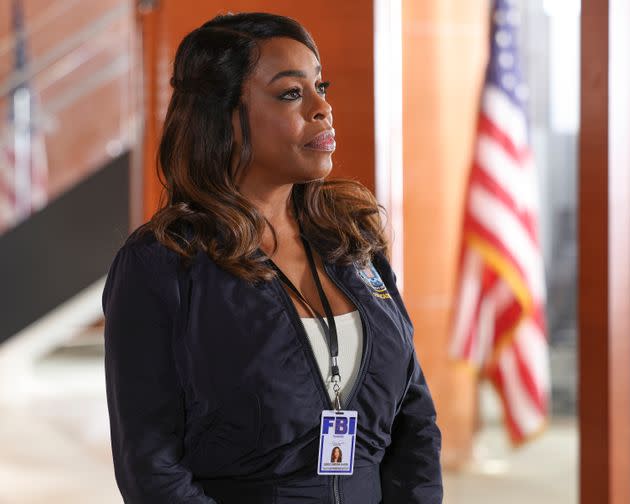
Niecy Nash-Betts as FBI trainee Simone Clark in ABC's "The Rookie: Feds." (Photo: Raymond Liu/ABC)
It’s telling that both new shows feature Black women as lead characters, each confronting institutions that weren’t made by or for people who look like them. On “The Rookie: Feds,” Niecy Nash-Betts plays Simone Clark, a new FBI trainee. In deciding to join the bureau, Simone wants to help increase the paltry representation of Black women in the FBI’s ranks.
That premise, according to co-creators Terence Paul Winter and Alexi Hawley, was their intentional way of tackling systemic issues in the show, a spinoff of “The Rookie.” In 2020, that show underwent a significant overhaul to better address racial inequities in policing.
“We sort of take it upon ourselves to be a show that deals with matters of policing and systemic injustice,” Hawley told HuffPost at a Television Critics Association panel previewing the new series earlier this month. “So it was very much in our hearts when we created this show that Terence and I really wanted to address what it would be like for Niecy’s character to be inside an organization that is traditionally male, traditionally white and is traditionally stuck in the past. And so the clash of those two cultures and those two forces makes it inherently dramatic.”
“We have very honest and frank conversations in the room about the realities of systemic problems in policing, and then we try to figure out: How can we incorporate that in the story — still entertain, but be honest?” Winter added. “That’s the thing. How can we be honest about this?”
But rather than take a critical stance on the system itself, the show seems most concerned with helping both sides understand each other better. It addresses the issue of police reform through the tension between Simone and her father Cutty (Frankie Faison, probably best known for playing Baltimore police commissioner Ervin Burrell on HBO’s “The Wire”). Formerly incarcerated, Cutty is a community leader and police reform advocate, who understandably is not pleased with Simone’s decision to join the FBI.
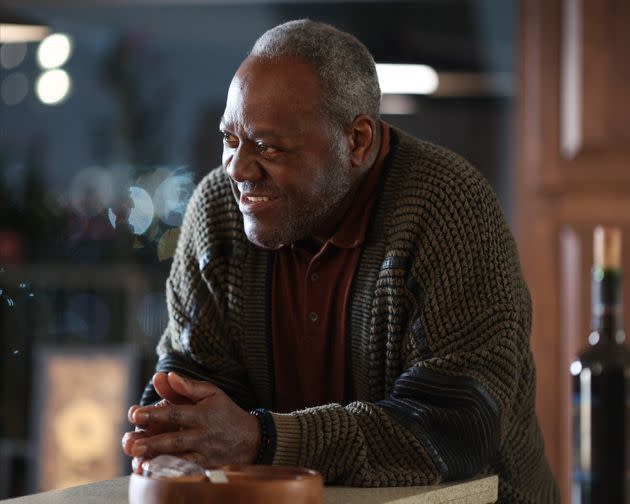
Frankie Faison as Cutty in ABC's "The Rookie: Feds." (Photo: Raymond Liu/ABC)
“How are you gonna represent police reform, when you got the police in our home?” Simone says to him in the show’s first episode. “Well, you just tell them that I’m working in a brand-new unit, and I’m gonna reform the FBI from the inside.”
As Faison explained at the TCA panel, the fraught dynamic between the two is “amazing drama,” he said. “And I look for transformation, something that will bring Cutty closer to understanding law enforcement and will bring law enforcement closer to understanding that there is a domestic side, a human side of these people that needs to be touched upon. That’s exciting.”
Simone and Cutty’s relationship is indeed an intriguing piece of this show, and it goes further than prior police procedurals in challenging these institutions. However, it feels too little too late, and the show’s approach seems specifically designed to be able to have it both ways. While trying to challenge the problems within the system, the show also still upholds it.
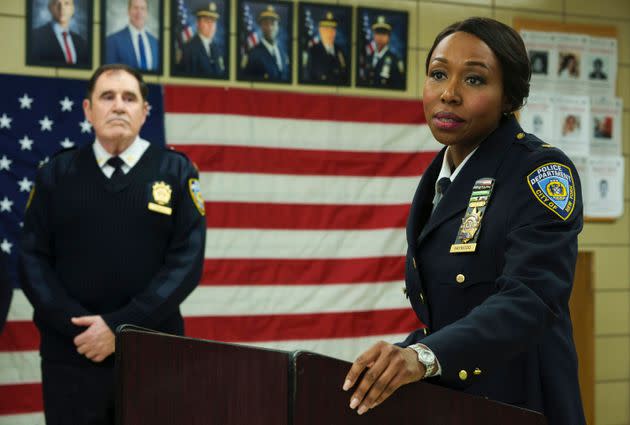
Amanda Warren as Deputy Inspector Regina Haywood, the newly promoted boss of the 74th Precinct, on the new CBS series "East New York." (Photo: CBS Photo Archive via Getty Images)
“East New York” similarly makes some tweaks to the structure of the police procedural, while tiptoeing around the faulty foundation. Set in the predominantly Black and brown Brooklyn neighborhood of the same name, “East New York” follows Regina Haywood (Amanda Warren), the newly promoted commanding officer of the local precinct.
Many of Regina’s colleagues and superiors — including TV veteran Jimmy Smits as her boss, returning to the police procedural genre two decades after “NYPD Blue” — are also people of color. That gestures at the idea that individuals can’t and should not be expected to fix a flawed system. But at least based on the pilot episode provided to critics, the show doesn’t seem to be heading in that direction.
Co-creators Mike Flynn and William Finkelstein said their aim was to depict how the police’s work “affects the lives of the community,” as Flynn said at CBS’s TCA panel. “We also wanted to show or get a sense of how cops are working to bridge this gap between the community and the police that has been fractured, you know, by them working in communities of disenfranchised people, and that they actually are here to kind of do some good.”
“How do we change the perception of cops looking at the people who live in this community? How do we change the perception of the people looking at cops?” Finkelstein added. “That’s the business of the series.”
It’s an argument we’ve seen from lawmakers too. Instead of overhauling the system and redirecting law enforcement funding into other social programs, they say we should focus on bridging divides between police and the communities they serve. For instance, in a June 2020 op-ed in the wake of mass demonstrations following Floyd’s murder, then-Democratic presidential candidate Joe Biden wrote that “I’ve long been a firm believer in the power of community policing — getting cops out of their cruisers and building relationships with the people and the communities they are there to serve and protect.”
But the system itself remains broken. Various iterations of community policing initiatives have been around for decades. Many experts have found that in practice, they are implemented inequitably and effectively reinforce racial disparities in policing.
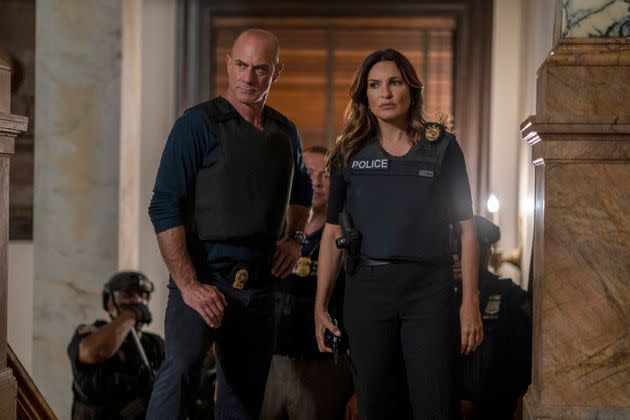
Christopher Meloni as Detective Elliot Stabler and Mariska Hargitay as Captain Olivia Benson in the season premiere of "Law and Order: SVU" last week. (Photo: NBC via Getty Images)
Like these societal questions about policing itself, it’s hard not to wonder if these shows are becoming increasingly untenable. Why not abolish the police procedural? What is it even for anymore?
At the same time, it’s not surprising they’re still getting made. Audiences consistently tune in each week. In the 2021-22 broadcast TV season, three of the top 10 highest-rated shows in the 18-49 demographic were law enforcement dramas: “9-1-1,” “Chicago P.D.” and “Law & Order: SVU.” Similarly, law enforcement dramas made up five of the top 10 overall shows in terms of total viewers: “NCIS,” “FBI,” “Blue Bloods,” “The Equalizer” and “Chicago P.D.”
The appeal of the network TV procedural is in its familiar tropes and rhythms. Turn on any police procedural, new or old, and there are the usual chase sequences and interrogation scenes. There’s someone who shouldn’t be on the case, but has a hunch there’s something more. There’s the fish out of water aspect: a new person in a new job. There are elements of a workplace show: the repartee and camaraderie of characters who’ve spent a lot of hours together, through thick and thin.
At the end of a long day, if you want to sit down and watch something in which you know exactly what to expect and won’t have to think too much about it, network TV is your friend. It’s why, despite all of its well-documentedproblems, the “Law and Order” franchise endures, playing forever on basic cable and spawning spinoff after spinoff. It’s why we love whenever Benson and Stabler reunite.
But even as TV creators make well-meaning efforts to evolve the format, it doesn’t make up for the fact that for years, cop stories on-screen were presented almost entirely unchallenged. In 2020, the advocacy organization Color of Change released an extensive study of all of the crime-related scripted series in the 2017-18 TV season. As Color of Change president Rashad Robinson wrote in the report: “The crime genre glorifies, justifies and normalizes the systematic violence and injustice meted out by police, making heroes out of police and prosecutors who engage in abuse, particularly against people of color.”
With a handful of exceptions, the researchers found that the shows largely valorized its main law enforcement characters, “making wrongful actions seem right by depicting bad actions as being committed by ‘Good Guy’ characters, thereby framing wrongful actions as relatable, forgivable, acceptable and ultimately good.” In addition, “almost all series conveyed the impression that change is not needed: they depicted a system that does not actually have serious problems related to race, gender, violence and the abuse of power.”
Despite the incremental improvements in these new shows, the cops are still the protagonists. They still get to have dimensionality. They still get the benefit of the doubt, which isn’t as readily afforded to the people they’ve harmed, who historically have been represented through one-dimensional tropes. Understanding each side better and trying to meet each other in the middle is not a tenable approach when one side has a lot more power — power that decades of copaganda shows have helped to perpetuate.
This article originally appeared on HuffPost and has been updated.
